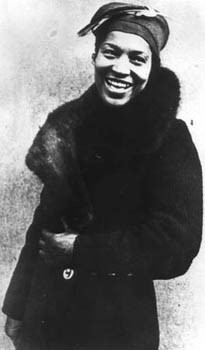Zora Neale Hurston
Folklorist

1891 - 1960
Inducted in 1990
Biography
Zora Neale Hurston not only stands as the most celebrated black female writer ever to work in Florida, but also one of the undisputed titans of African-American literature in U.S. history. A major figure of New York's Harlem Renaissance in the 1920s, Hurston's writing influenced generations of black writers, including such distinguished, latter-day figures as Ralph Ellison, Toni Morrison, Alice Walker and Gayl Jones.
Hurston was born (as Zora Lee Hurston) in Notasulga, Alabama, the fifth of eight children. When she was 3, her family moved to the all-black town of Eatonville, Florida, where her father (a Baptist preacher) eventually became the town's mayor. Soon after her mother's untimely death in 1904, her father remarried, and Hurston was soon sent to a boarding school in Jacksonville. After years of menial work and hardships, she finally graduated (at age 25) from high school (Morgan Academy in Baltimore) in 1918.
Upon graduation she immediately enrolled at Howard University in Washington, D.C. It was as a student there that Hurston had her first story published. The story appeared in the college's literary magazine, Stylus, in 1921.
Hurston was soon offered a scholarship from Barnard College in Manhattan. Once settled in New York, she immersed herself in a black literary movement that eventually became known as the Harlem Renaissance. Her writing flourished, with two more short stories published.
After graduating with a bachelor's degree in anthropology in 1927, Hurston married a jazz musician, a classmate she had met at Howard. She spent two years doing graduate research in anthropology at Columbia University, where one of her classmates was Margaret Mead.
When her marriage ended in 1931, Hurston traveled extensively through the South and in the Caribbean, learning local cultures as part of her on-going research. In 1934, her first novel appeared, Jonah's Gourd Vine, published by J.B. Lippincott. The following year, she published Mules and Men, an anthology of black folklore. In 1939, on a Guggenheim Fellowship that supported her anthropological research in Haiti, Hurston finished what would become her masterwork, Their Eyes Were Watching God, a novel she wrote in seven weeks.
In the midst of a remarkable publishing career, in 1939 Hurston signed on with the Florida Writers Project, a part of the federal Works Progress Administration, as a folklorist. She toured Florida on a sound recording expedition (often accompanied by co-worker Stetson Kennedy) collecting songs and stories from working people using equipment on loan from the Library of Congress (where 18 of her original recordings are preserved).
During the 1940s, Hurston's reputation as a major literary figure vaulted. She published two more novels and more than a dozen stories that appeared in such national titles as the Saturday Evening Post and the American Mercury. In 1947, Hurston won another Guggenheim and moved to Honduras where she collected folklore that became the basis of her fourth (and last) novel, Seraph on the Swanee, published in 1948.
But the 1950s brought Hurston a litany of troubles that eventually drove her into obscurity and poverty. Spending most of her time in South Florida, she worked at a variety of jobs, ranging from a maid to a newspaper reporter. In 1957, she moved to Fort Pierce where a family friend from Eatonville invited her to live in a small house rent-free. In 1960, a debilitating stroke forced her into a welfare home, where she died at the age of 69. She was buried in an unmarked grave in a segregated cemetery.
In the early 1970s, Hurston's remarkable life was rediscovered by noted black author Alice Walker, who had been heavily influenced by Hurston's writings. In 1973, Walker travelled to Fort Pierce and found what is believed to be Hurston's gravesite. Walker had a headstone installed with the inscription "Zora Neale Hurston: A Genius of the South."
Today, helping keep Hurston's legacy alive are two annual festivals, one in her childhood home of Eatonville, The Zora Neal Hurston Festival of the Arts & Humanities, and ZoraFest, held each spring in Fort Pierce. A feature-length documentary on her life, Jump at the Sun, was released in 2008 and rebroadcast by PBS in 2010. Also in 2010, Hurston was inducted into the New York Writer's Hall of Fame.
Related Links
- Zora Neale Hurston Festival and Museum - http://www.zoranealehurstonfestival.com/
- Zora Neale Hurston Digital Archive - http://www.zoranealehurston.ucf.edu/

